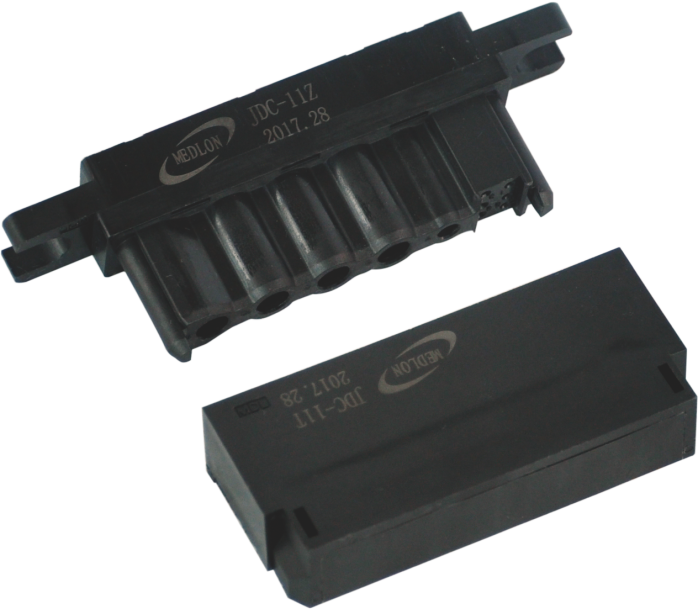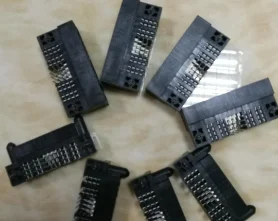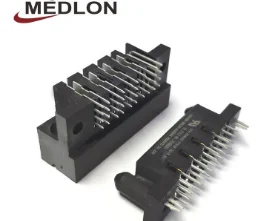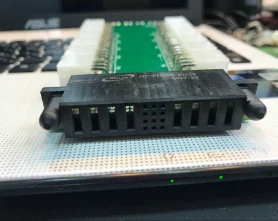



feature: Input voltage: maximum 220V, minimum 110V Output voltage: generally 5V or 12V Input current: Varies according to output voltage and load power Output power: depends on load capacity and output voltage Working frequency: generally 50Hz or 60Hz Advantage: 1. Versatility: Combination AC-DC and split power options are available, and the module can be configured to fit most designs 2. Convenient and flexible: easy to maintain and replace. 3. Safe and reliable: waterproof, dustproof and durable, 4. Quick connection: plug-in connection, can be quickly connected and disconnected, convenient for daily use 5. Multiple interface options: such as circular connectors, square connectors, threaded connectors, etc.
Specifications
| Component Type | breadboard power connector |
| Gender | Header/Receptacle |
| Header Pin Pattern (Left to Right) | Power/Signal |
| Number of Contacts (Power) | 4 |
| Number of Rows (Power) | 1 |
| Number of Contacts (Signal) | $keyworrd{12} |
| Number of Rows (Signal) | 8 |
| Termination Style | Solder To Board |
| Orientation | Right Angle |
| Pitch (Power) | 6.35mm (0.250in) |
| Pitch Signal) | 2.54mm (0.100in) |
| Current Rating | $keyworrd{13}A max. for One Powered Contact |
| Resistance (Power Contact) | Maximum for mated pair is 2mΩ |
| Resistance (Signal Contact) | Maximum for mated pair is 20mΩ |
| Dielectric Withstanding Voltage | $keyworrd{14}V DC for power ; $keyworrd{15}V DC for signal contacts |
| Durability (Mating cycles) | $keyworrd{16} Mating Cycles |
| Operating Temperature Range | -$keyworrd{13}°C to +125°C |
| Material Housing | PPA, glass fiber reinforce, UL94V-0 |
| Plating Contact area | 0.76μm (29.921μin) Gold |
| ail Plating (Signal) | 1.98μm (78μin) Tin |
| Tail Plating (Power) | 1.98μm (78μin) Tin |
| Guide Feature | Guide Pin Pocket |
| Packaging | Cartons or Tray |



1.Can breadboard power connectors handle power surges or fluctuations?
We focus on teamwork and communication to achieve common goals, We attach great importance to this detail. Yes, power connectors can handle power surges or fluctuations. However, it is important to use the correct type of power connector for the application. Some power connectors are designed to handle higher levels of power surges or fluctuations than others.
2.Can breadboard power connectors handle high voltages?
Being one of the top breadboard power connector manufacturers in China, We attach great importance to this detail. No, power connectors are not designed to handle high voltages. High voltage applications require specialized connectors that are designed to safely handle the high voltage.

3.About breadboard power connector delivery date
The delivery date for power connectors will depend on the type of connector, the quantity, and the supplier. Generally, most suppliers will provide an estimated delivery date when the order is placed. If the order is urgent, some suppliers may be able to provide a faster delivery time.
4.What is the purpose of a breadboard power connector?
We operate our breadboard power connector business with integrity and honesty. A power connector is used to connect a power source to an electrical device. It is used to provide power to the device and to protect the device from power surges.

5.What types of breadboard power connectors are available in the market?
Our breadboard power connector products undergo strict quality control to ensure customer satisfaction. 1. Molex Connectors 2. ATX Connectors 3. SATA Connectors 4. PCIe Connectors 5. 4-Pin Connectors 6. 6-Pin Connectors 7. 8-Pin Connectors 8. 10-Pin Connectors 9. 12-Pin Connectors 10. 24-Pin Connectors
6.About breadboard power connector production skills training
Power connector production skills training is designed to help workers learn the skills needed to produce power connectors. This type of training typically covers topics such as the types of power connectors available, the tools and materials needed to produce them, and the steps involved in the production process. It may also include instruction on safety protocols and quality control measures. Training may be provided in a classroom setting or online.

7.How do you identify the proper orientation for a breadboard power connector?
We maintain a certain amount of R&D investment every year and continuously improve operational efficiency to provide better services to our cooperative customers. The proper orientation for a power connector can be identified by looking at the shape of the connector and the corresponding port. The shape of the connector should match the shape of the port, and the pins should line up with the holes in the port. Additionally, the connector should have a notch or other indicator that shows which side should be facing up.
8.Are there any options for waterproof or dustproof breadboard power connectors?
As one of the top breadboard power connector manufacturers in China, we take this very seriously. Yes, there are several options for waterproof and dustproof power connectors. These include IP67 rated connectors, which are designed to be waterproof and dustproof, as well as waterproof and dustproof cable glands, which are designed to protect cables from water and dust. Additionally, there are several types of waterproof and dustproof junction boxes, which are designed to protect electrical connections from water and dust.

9.How do you ensure proper insulation and protection against electrical hazards when using a breadboard power connector?
1. Use the correct type of power connector for the application. 2. Inspect the power connector for any signs of damage before use. 3. Ensure that the power connector is properly rated for the voltage and current of the application. 4. Use a surge protector or other protective device to protect against electrical surges. 5. Use a ground fault circuit interrupter (GFCI) to protect against electrical shock. 6. Use a power cord with a strain relief to prevent the power connector from becoming loose. 7. Use a power connector with a built-in fuse or circuit breaker to protect against overloads. 8. Make sure the power connector is properly secured to the device or outlet. 9. Use a power connector with a built-in insulation sleeve to protect against electrical hazards.
10.About breadboard power connector origin
The origin of power connectors can be traced back to the early days of electricity. In the late 19th century, the first electrical connectors were developed to connect electrical devices to power sources. These connectors were made of metal and were designed to be inserted into a socket. Over time, the design of power connectors has evolved to include a variety of shapes and sizes to accommodate different types of electrical devices. Today, power connectors are used in a wide range of applications, from consumer electronics to industrial machinery.

11.Are there any options for tool-less installation of breadboard power connectors?
Yes, there are several options for tool-less installation of power connectors. These include push-in connectors, twist-lock connectors, and snap-in connectors. Push-in connectors are the most common type of tool-less power connector and are designed to be inserted into a power socket without the need for any tools. Twist-lock connectors are also available and are designed to be twisted into place. Finally, snap-in connectors are designed to be snapped into place without the need for any tools.
12.What are the advantages of using a breadboard power connector instead of a wire-to-wire connection?
Our products & services cover a wide range of areas and meet the needs of different fields. 1. Power connectors provide a secure and reliable connection that is less prone to accidental disconnection. 2. Power connectors are easier to install and require less time and effort than wire-to-wire connections. 3. Power connectors are more resistant to vibration and shock, making them more reliable in harsh environments. 4. Power connectors are more efficient at transferring power, reducing the risk of overheating and fire. 5. Power connectors are more cost-effective than wire-to-wire connections, as they require fewer components and less labor.

13.Can breadboard power connectors be used for data transmission as well?
Our mission is to provide customers with the best solutions for breadboard power connector. No, power connectors are not designed for data transmission. They are designed to carry electrical power from one device to another. Data transmission requires a different type of connector, such as an Ethernet or USB connector.
14.Is it possible to customize the design or length of a breadboard power connector?
We focus on our customers' needs and strive to meet their expectations, so we take this very seriously. Yes, it is possible to customize the design or length of a power connector. Many companies offer custom power connectors that can be designed to meet specific requirements. These custom connectors can be designed to fit a variety of applications and can be made in different lengths, shapes, and sizes.

15.About breadboard power connector production equipment
Power connector production equipment is used to manufacture power connectors for a variety of applications. This equipment is used to create a variety of power connectors, including those used in automotive, industrial, and consumer electronics. The equipment typically includes a variety of machines, such as presses, injection molding machines, and die-casting machines. The machines are used to create the various components of the power connectors, such as the contacts, housings, and terminals. The equipment is also used to assemble the components into the finished product.
16.What is a breadboard power connector?
We focus on innovation and continuous improvement to maintain a competitive advantage. A power connector is a type of electrical connector used to connect a power supply to a device. It is typically used to provide power to electronic devices such as computers, printers, and other electronic equipment. Power connectors come in a variety of shapes and sizes, and are designed to fit specific power requirements.

Tag:car radio power connector,atx 24 pin power connector,locking power connector,6 pin power connector to 8 pin,20 pin power connector